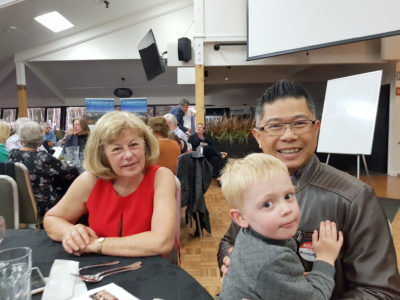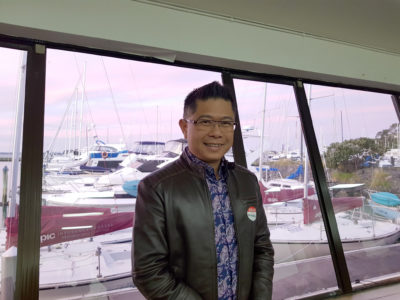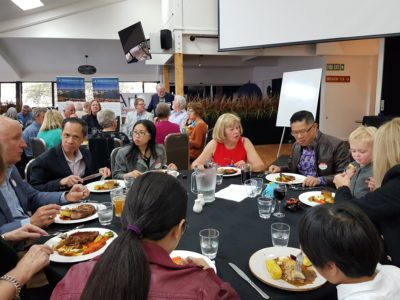
What are the chances of a flight attendant who flew in a group of beleaguered refugees from Indonesia, introducing Mitchell Pham (a 12-year-old Vietnamese refugee on the same flight) 35 years later– at a formal sit-down dinner, hosted by Rotarians?
Pham, winner of the Kea World Class New Zealand Award, was a guest speaker at a fundraiser hosted recently by Rotary Club of Half Moon Bay at the Bucklands Beach Yacht Club.
Destiny often writes a fascinating script which unfolds as Rotarian Michelle Godsiff, dressed in her old air hostess uniform, speaks of the time she was part of the crew that didn’t know what the term `refugee’ meant.
It wasn’t an easy flight, for the frightened passengers or the crew.
A throwback to the time the Vietnam War ended and the country was in the throes of an economic crisis, the narrative is through the eyes of a 12-year-old dodging bullets as Pham tries to escape a life of poverty and the vagaries of war.

Pham, now a Kiwi legend, says that after two failed attempts to cross the border, his family was put in prison – a makeshift, fenced camp with water that was hip-high.
“Even as a 10-year-old, I was conscious that something was wrong as I noticed young, teenage girls being taken in the barracks to be returned in the morning,” he recalls.
Desperate for their son to have a better life, Pham’s parents put him on a boat in the middle of the night. They didn’t have enough money to finance the family’s escape.
“We rode out in the night along with some relatives. The fishing boat was barely 12 metres (long) and there were 67 of us, all jammed up. Hardly did we make our way from the river out to sea when the coastguards spotted us. They started shooting with machine guns. It was terrifying, as bullets were flying above my head. Everyone was screaming. We thought we were going to die. I was petrified.”
While the refugees survived the night, they soon ran out of fuel, water and food.
“Some people started talking of suicide,” he says.
Hours later, there was a flicker of hope as they saw a cruise liner on the horizon.
“We frantically waved; trying to draw attention for what seemed an eternity. As the cruise ship made its way towards us, we spotted passengers taking lots of pictures and videos. After a while, they started the engine and left without giving us any food, water or fuel.
“To this day, I can’t fathom how anyone could have turned their back on us. There is a code at sea that you are bound by.”

The cruise liner cranking up the engine almost toppled the fishing boat.
On the morning of day six, the exhausted and desolate refugees spotted an oil rig.
“Fortunately, they sent us a rescue boat. The day after, there was a big tropical storm that smashed our boat to tiny pieces. We felt like the luckiest people alive!” says Pham.
Later, he was transported to a refugee camp in Indonesia with 22,000 other refugees, some with serious mental health problems. He soon realised he had to learn English if he had to be quickly picked up by one of the 33 countries working with the UN.
Next, he started teaching English at the camp. “I was probably the youngest person on the UN payroll,” he says.
The first thing he remembers on landing in New Zealand is “the air smelt so fresh”.
In his last year at Auckland University, Pham started a tech company with his mates. Soon they expanded to 11 tech companies but with the global financial crisis hitting hard, he says the toughest job was to lay off staff who were like family.
“Resilience is so important, more so at a time like this. I do believe that feeling like a victim is an emotion. But feeling and acting like a victim is a choice.”
The social entrepreneur says that while he was not so successful in bringing his parents to New Zealand, he takes pride in having reunited almost 220 other refugee families.








